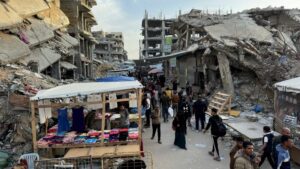The Electronic Intifada 5 May 2025
Maha Mahdi, 51, had worked hard for many years to save up money for her children’s education.
The mother of four sons aged between 12 and 19 combined a daytime job as an assistant at a medical analysis laboratory with private lessons to save up money for her children’s education.
She had prudently turned her savings into gold. She always dreamed her children would join the medical profession. But studying medicine is expensive, and gold seemed a sensible method for saving in the meantime.
But in Gaza today, cash has all but disappeared. Aside from the brief ceasefire interlude that started in January and Israel ended on 19 March, when some cash aid was delivered by international organizations, no cash had entered Gaza for 15 months prior and none since.
In the first three months alone after October 2023, according to the World Bank, Israel destroyed or damaged 93 percent of all bank branches.
With no banks and only the cash that was already there – so overused by now that it is starting to disintegrate – Palestinians in Gaza have had to improvise.
Digital transactions have eased some of the pressure, while bartering has become common.
People have been burning through what savings they may have had, including Maha, who parted with her gold in order to get much-needed cash for survival.
“For every piece of gold I sold, I felt like I was selling a piece of my dreams and ambitions.”
Salaries too are impossible to convert to cash, and anyone still able to receive an income has had to pay forbidding commissions as traders – themselves desperate for cash – have lifted rates as high as 35 percent.

